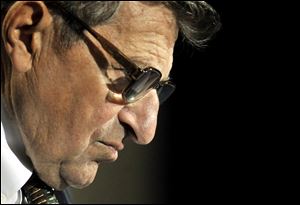
Penalties shock Penn State grads
Local alum says go after university, but don't hurt current players
7/24/2012
The NCAA ordered Penn State to vacate its wins from 1998 to 2011, took away 10 scholarships from the football program in each of the next four years, and banned the team from playing in any bowl games for the next four seasons for the sex-abuse scandal that happened with coach Joe Paterno on the sidelines. Penn State must also pay a $60 million fine.
When Jerry Sandusky announced his resignation as an assistant coach with the Penn State football team in 1999, Robert Bidwell regarded it as an unusual departure.
"I thought, why did he leave so soon?" recalled Bidwell, a 1973 Penn State graduate and a Perrysburg resident. "I never really knew."
Bidwell found out in November what may have precipitated Sandusky's resignation. A grand jury indicted the former assistant coach on multiple counts of sex crimes against young boys, and a Centre County jury in June found Sandusky guilty of 45 of 48 charges.
RELATED ARTICLE: Big Ten landscape shaken by PSU fallout
RELATED ARTICLE: NCAA's gut check was gut or 2 short
RELATED ARTICLE: Penn State gets $60M fine, ban from bowls
Bidwell was saddened and stunned by the initial allegations and charges against Sandusky, who was an assistant coach at Penn State from 1968 to 1999.
On Monday, Bidwell was among a legion of local and national Penn State alumni who expressed their shock after the NCAA and the Big Ten Conference levied unprecedented sanctions against Penn State's football program, penalties tied to the institution's role in enabling the Sandusky scandal.
The NCAA ordered Penn State to vacate its wins from 1998 to 2011, took away 10 scholarships from the football program in each of the next four years, and banned the team from playing in any bowl games for the next four seasons. Penn State must also pay a $60 million fine.
The NCAA will implement a system of checks and balances within the Penn State athletic department and will establish an "athletics integrity monitor" to oversee compliance. Penn State signed a consent decree with the NCAA, stating that it would not appeal those penalties.
"That's the only thing the NCAA can do," said Bidwell, the former president of the Penn State Alumni Association of Northwest Ohio. "They're penalizing a new coach and the players now for something that happened in 1998. It seems kind of backwards to me. If they want to smack the university with a fine, that's fine. If management is penalized heavily, that's fine. But the football team? I think that's unfair to the kids on the team now."
In addition to the NCAA's sanctions, the Big Ten has censured Penn State and rendered the football program ineligible for the conference title game for the next four seasons. Penn State will lose $13 million in conference bowl revenues; the money instead will be given to charities in Big Ten cities that are dedicated to protecting children.
Iowa president Sally Mason, the chair of the Big Ten's council of presidents and chancellors, said the council discussed a multitude of options in regards to reprimanding Penn State, though there was no actual movement to kick Penn State out of the Big Ten.
"Everything was on the table," Mason said. "Everything was discussed."
Big Ten commissioner Jim Delany attributed the breakdown at Penn State to the culture created by the football program and the leadership at the school.
"A combination of a strong personality, lots of power, and some celebrity," Delany said. "That challenges the control of a program or programs and undermines the controls in place that makes sure institutional controls are dominant and not subordinate to intercollegiate programs."
When Bidwell read the Freeh Report -- a lengthy report released July 12 that concluded that former Penn State football coach Joe Paterno, who died in January, and other Penn State officials had covered up allegations against Sandusky of sexual abuse against children -- it confirmed Bidwell's initial thoughts of mismanagement within the athletic program. But, Bidwell said, he didn't know what Paterno was legally allowed to do. Furthermore, he doesn't believe the Freeh Report should be regarded as the conclusive report on the Penn State football and athletic programs.
"We don't know what happened [in 1998]," Bidwell said. "There's conjecture going on. They're saying that Joe was running the show and I thought, I have a hard time believing that. There are people three or four levels above him who should have said, 'wait a minute …' I can't believe that they would defer to him. There's a lot of unanswered questions."
When the NCAA announced unprecedented sanctions against Penn State on Monday in Indianapolis, Bidwell again was stunned. When asked about the mood of other Penn State alumni regarding the eight-month saga, Bidwell said it had always been that of shock and sadness. But there was also some reservation.
"A lot of the emails we see flying around alums is that the whole story's not out. Or 'follow the money' or 'rush to judgment,' " Bidwell said. "But when the university said, 'we accept it,' at that point I said, 'everything's doomed.' "
Contact Rachel Lenzi at: rlenzi@theblade.com, 419-724-6510, or on Twitter @RLenziBlade.